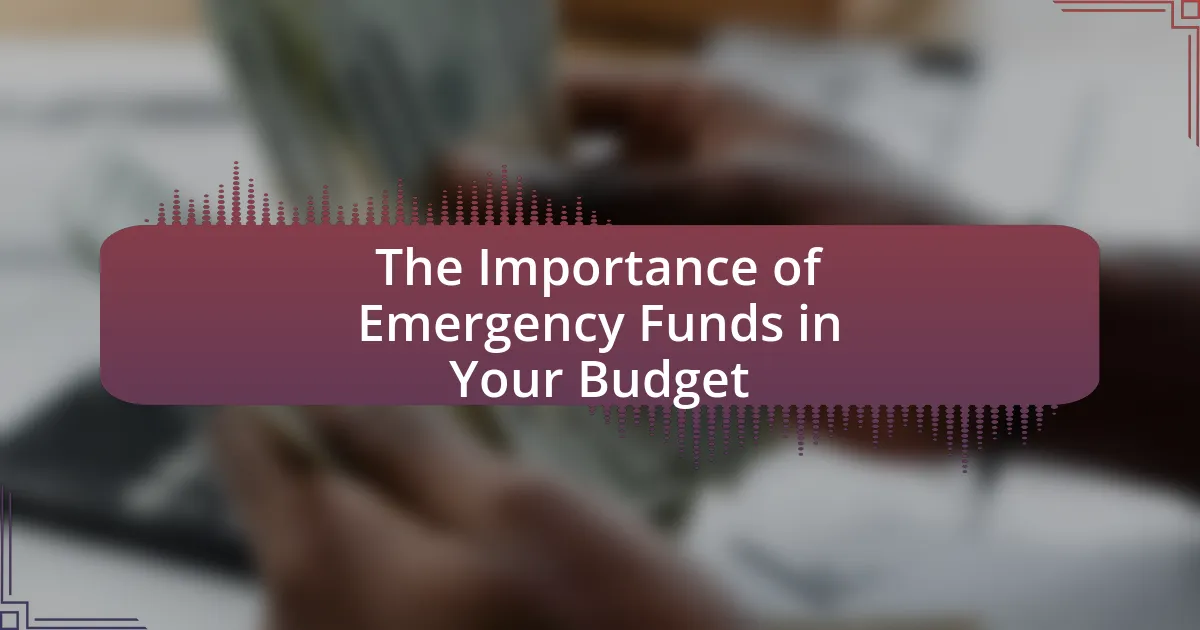Budgeting for travel involves planning and allocating financial resources to cover various trip expenses, including transportation, accommodation, food, and activities. Effective budgeting enhances the travel experience by allowing individuals to prioritize spending and avoid overspending, leading to greater satisfaction and reduced stress. Key components of a travel budget include estimating costs for essential and non-essential items, while strategies for saving include creating dedicated savings accounts and cutting everyday expenses. The article also highlights common pitfalls to avoid, such as underestimating costs and neglecting additional expenses, ensuring travelers can enjoy their trips without financial strain.

What is Budgeting for Travel?
Budgeting for travel is the process of planning and allocating financial resources to cover the costs associated with a trip. This includes expenses such as transportation, accommodation, food, activities, and miscellaneous costs. Effective budgeting allows travelers to set realistic spending limits, prioritize their travel goals, and avoid overspending, ultimately leading to a more enjoyable and stress-free travel experience. According to a survey by the American Express Global Business Travel, 60% of travelers reported that having a budget helped them manage their expenses better during trips.
How can effective budgeting enhance your travel experience?
Effective budgeting enhances your travel experience by allowing you to allocate resources efficiently, ensuring you can enjoy activities and accommodations without financial stress. When travelers set a clear budget, they can prioritize spending on experiences that matter most to them, such as dining, excursions, or cultural activities. According to a study by the Global Business Travel Association, travelers who budget effectively report higher satisfaction levels, as they can engage in planned activities without the anxiety of overspending. This structured financial approach not only maximizes enjoyment but also minimizes the risk of unexpected expenses, leading to a more fulfilling and memorable trip.
What are the key components of a travel budget?
The key components of a travel budget include transportation, accommodation, food, activities, and miscellaneous expenses. Transportation costs cover flights, car rentals, or public transit fares, which can significantly impact the overall budget. Accommodation expenses involve hotel stays, hostels, or vacation rentals, and vary based on location and duration of stay. Food costs encompass meals, snacks, and beverages, which can fluctuate depending on dining choices. Activities refer to entrance fees for attractions, tours, and entertainment, which are essential for planning the itinerary. Miscellaneous expenses include travel insurance, souvenirs, and tips, which are often overlooked but can add up. Each component plays a crucial role in ensuring that travelers stay within their financial limits while enjoying their trip.
How does budgeting impact travel choices and experiences?
Budgeting significantly influences travel choices and experiences by determining the destinations, accommodations, and activities travelers can afford. When individuals set a budget, they prioritize their spending, which often leads to selecting more affordable destinations or travel options. For instance, a study by the Global Business Travel Association found that 70% of travelers adjust their plans based on budget constraints, opting for less expensive flights or accommodations to stay within their financial limits. This financial planning not only affects where travelers go but also shapes their overall experience, as those on tighter budgets may miss out on premium experiences or activities that require higher expenditures.
Why is saving for a vacation important?
Saving for a vacation is important because it allows individuals to enjoy travel experiences without incurring debt. Financial planning for a vacation ensures that travelers can cover expenses such as accommodation, transportation, and activities, leading to a more enjoyable and stress-free experience. According to a survey by the American Express Global Business Travel, 76% of travelers reported that taking vacations improves their overall well-being, highlighting the psychological benefits of travel. Additionally, saving for a vacation encourages disciplined budgeting habits, which can lead to better financial management in other areas of life.
What are the financial benefits of planning ahead for travel?
Planning ahead for travel provides significant financial benefits, including cost savings on transportation and accommodation. Early booking often leads to lower prices; for instance, travelers can save up to 30% on flights and hotels by reserving several months in advance. Additionally, planning allows for better budgeting, as travelers can allocate funds for activities and dining, avoiding last-minute expenses that can inflate costs. Research indicates that travelers who plan ahead are less likely to incur unexpected fees, such as those associated with last-minute bookings or changes. Overall, strategic planning enhances financial control and maximizes the value of travel experiences.
How can saving for travel reduce stress during the trip?
Saving for travel reduces stress during the trip by providing financial security and peace of mind. When travelers have a dedicated savings fund, they can avoid the anxiety associated with unexpected expenses or overspending. A study by the American Psychological Association found that financial stress is a significant contributor to overall stress levels, and having a budget can alleviate this concern. Additionally, knowing that funds are allocated for specific travel experiences allows individuals to enjoy their trip without the burden of financial worry, leading to a more relaxed and enjoyable vacation.

What strategies can you use to save for your next vacation?
To save for your next vacation, create a dedicated savings account specifically for travel expenses. This strategy allows you to separate vacation funds from regular spending, making it easier to track your progress. Research shows that individuals who allocate funds to a separate account are more likely to reach their savings goals, as it reduces the temptation to spend that money on non-vacation-related expenses. Additionally, consider setting up automatic transfers to this account each month, which can help build your savings consistently without requiring active effort.
How can you set a realistic travel budget?
To set a realistic travel budget, first determine your total available funds for travel, including savings and income. Next, research the destination to estimate costs for accommodation, transportation, food, activities, and miscellaneous expenses. For example, a study by the U.S. Travel Association indicates that the average American spends around $1,200 on a domestic trip, which can serve as a benchmark. Finally, allocate funds to each category based on your research and adjust as necessary to ensure that your total does not exceed your available funds.
What factors should you consider when estimating travel costs?
When estimating travel costs, consider transportation, accommodation, food, activities, and miscellaneous expenses. Transportation includes airfare, train tickets, or fuel costs for driving, which can vary significantly based on distance and mode of travel. Accommodation costs depend on the type of lodging chosen, ranging from hotels to hostels or vacation rentals, with prices fluctuating based on location and season. Food expenses should account for dining out versus cooking, as well as the cost of meals in different regions. Activities encompass entrance fees, tours, and entertainment, which can vary widely depending on the destination. Lastly, miscellaneous expenses include travel insurance, souvenirs, and tips, which can add up quickly. Each of these factors contributes to the overall budget and should be carefully evaluated to create an accurate estimate of total travel costs.
How can you prioritize your travel expenses?
To prioritize your travel expenses, categorize them into essential and non-essential items. Essential expenses include transportation, accommodation, and meals, while non-essential expenses encompass activities, souvenirs, and dining out. By focusing on essential expenses first, you ensure that your basic needs are met during your trip. According to a study by the American Express Global Business Travel, 70% of travelers report that budgeting for essential expenses significantly enhances their travel experience, allowing for better planning and reduced stress.
What are effective saving techniques for travel?
Effective saving techniques for travel include setting a dedicated travel fund, automating savings, and cutting unnecessary expenses. Establishing a separate account specifically for travel allows individuals to track their savings progress and avoid spending that money on other expenses. Automating transfers to this account each month ensures consistent contributions without the temptation to spend. Additionally, reviewing monthly expenses to identify and eliminate non-essential items, such as dining out or subscription services, can free up more funds for travel savings. According to a survey by Bankrate, 21% of Americans do not have any savings set aside for travel, highlighting the importance of proactive saving strategies.
How can you create a dedicated travel savings account?
To create a dedicated travel savings account, open a separate savings account specifically for travel expenses at a bank or credit union. This account should be distinct from your regular checking and savings accounts to help you track your travel savings more effectively. Many financial institutions offer high-yield savings accounts that can earn interest on your deposits, which can further enhance your savings. Additionally, setting up automatic transfers from your primary account to this travel savings account can help you consistently contribute to your travel fund, making it easier to reach your vacation goals.
What are some tips for cutting everyday expenses to save for travel?
To cut everyday expenses and save for travel, individuals should prioritize budgeting, reduce discretionary spending, and seek cost-effective alternatives. Creating a detailed budget helps identify areas where money can be saved, such as dining out less frequently or canceling unused subscriptions. According to a 2021 survey by Bankrate, 49% of Americans reported cutting back on non-essential spending to save for future goals, including travel. Additionally, using public transportation instead of driving can save on fuel and parking costs, further contributing to travel savings.

How can you track your travel savings progress?
To track your travel savings progress, create a dedicated savings account specifically for your travel funds. This method allows you to monitor your contributions and growth over time. Regularly update a spreadsheet or use a budgeting app to log your deposits and track your savings goal against your actual savings. According to a 2021 survey by Bankrate, 45% of Americans use separate accounts to manage their savings, which can enhance focus and motivation towards achieving specific financial goals.
What tools can help you monitor your savings for travel?
Budgeting apps such as Mint, YNAB (You Need A Budget), and Personal Capital can help you monitor your savings for travel. These tools allow users to set specific savings goals, track expenses, and visualize progress towards their travel budget. For instance, Mint provides a comprehensive overview of all financial accounts, categorizes spending, and sends alerts when users approach their budget limits. YNAB emphasizes proactive budgeting, helping users allocate funds for travel savings effectively. Personal Capital offers investment tracking alongside budgeting features, allowing users to see how their savings for travel fit into their overall financial picture.
How can budgeting apps assist in tracking travel expenses?
Budgeting apps assist in tracking travel expenses by allowing users to categorize and monitor their spending in real-time. These applications enable travelers to input expenses as they occur, providing an immediate overview of their budget status. For instance, a study by the National Endowment for Financial Education found that individuals who use budgeting tools are 30% more likely to stick to their financial plans. Additionally, many budgeting apps offer features such as expense alerts, budget limits, and visual spending reports, which help users identify areas where they can cut costs while traveling.
What methods can you use to stay motivated while saving?
To stay motivated while saving for travel, set clear, achievable goals and track your progress. Establishing specific savings targets, such as a certain amount for a vacation, creates a sense of purpose. Regularly monitoring your savings can reinforce your commitment and provide visual evidence of your progress, which is proven to enhance motivation. Research indicates that individuals who set specific financial goals are more likely to succeed in their savings efforts, as highlighted in a study by the American Psychological Association, which found that goal-setting significantly increases the likelihood of achieving desired outcomes.
What are common pitfalls to avoid when budgeting for travel?
Common pitfalls to avoid when budgeting for travel include underestimating costs, neglecting to account for additional expenses, and failing to plan for currency fluctuations. Underestimating costs can lead to insufficient funds, as travelers often overlook expenses such as meals, transportation, and activities. Neglecting additional expenses, like travel insurance or souvenirs, can also strain a budget. Furthermore, currency fluctuations can impact overall travel costs, especially when traveling internationally. According to a study by the Global Business Travel Association, travelers frequently exceed their budgets by 20% due to these common oversights.
How can overspending on travel affect your overall budget?
Overspending on travel can significantly disrupt your overall budget by depleting funds allocated for essential expenses. When travel costs exceed planned amounts, individuals may find themselves reallocating money from savings, bills, or other necessary expenditures to cover the excess. For instance, a survey by the American Express Global Business Travel revealed that 40% of travelers exceed their budgets, leading to financial strain and potential debt accumulation. This overspending can result in a lack of funds for future travel, emergencies, or retirement savings, ultimately compromising long-term financial stability.
What mistakes should you watch out for when planning your travel budget?
When planning your travel budget, you should watch out for underestimating costs, which is a common mistake. Many travelers fail to account for additional expenses such as meals, tips, and unforeseen fees, leading to budget overruns. According to a survey by the American Express Global Business Travel, travelers often overlook up to 30% of their total expenses when budgeting. Additionally, neglecting to research destination-specific costs can result in significant financial surprises. For instance, accommodation prices can vary widely based on location and season, impacting overall budget accuracy.
What are some practical tips for successful travel budgeting?
To successfully budget for travel, start by setting a clear travel budget that includes all potential expenses such as transportation, accommodation, food, activities, and souvenirs. This comprehensive approach ensures that you account for all aspects of your trip. Next, research and compare prices for flights and accommodations to find the best deals, as studies show that booking in advance can save travelers up to 30% on airfare. Additionally, create a daily spending limit based on your overall budget to avoid overspending during the trip. Using budgeting apps can help track expenses in real-time, making it easier to stay within your limits. Finally, consider setting aside a specific amount each month leading up to your trip, which can help accumulate the necessary funds without financial strain.





